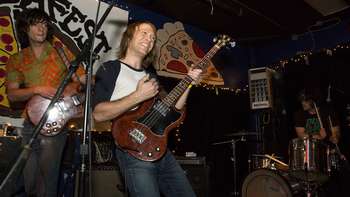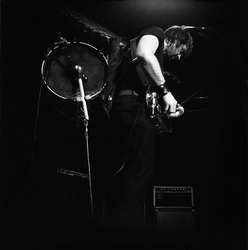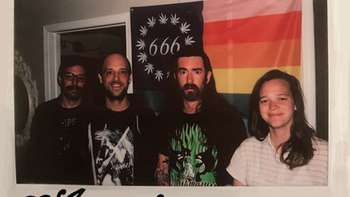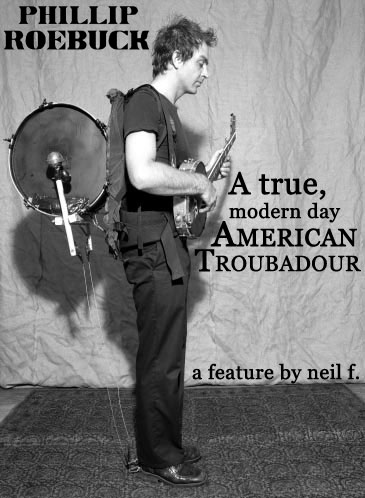
While Sufjan Stevens was busy making the banjo cool for the indie elite, Phillip Roebuck was trotting the world with drums attached to his feet. Combining the maverick traditions of the one-man band with manic spasms of frenzied banjo strumming and a perfect southern drawl, he's built a modern sound from outmoded methods. Fingers dancing on a banjo like Michael Flatley on amphetamines, all while bashing at a bass drum and tambourine combo strapped to his back and tied onto custom made spurs like a madman, he makes a noise like no other.
"I am Phillip Roebuck, a one man band", he says. "I play the five string banjo and drums at the same time. I use an unconventional picking style and tuning that I made up. The banjo I use was put together from scrap parts - I was aiming for the lightest and the cheapest, it's both. The drum apparatus I wear on my back was made using a standard tambourine and a small marching bass drum. The rest of it consists of an old hiking backpack, a piece of plywood and some standard parts I got at the hardware store. I put them all together and play what I consider to be rock and roll. Some sort of roots music for the modern age - if there is such a thing."
Sounds a little incongruous, doesn't it? Almost like a joke? A fact that Roebuck himself attests to. "When I'm setting up and the crowd sees me for the first time, usually murmurs and chuckles start floating around, and maybe the random 'what are you gonna do with that thing?' gets shouted out. Hearing, however, is believing, and on hearing Phillip for the first time, suddenly, the bizarre and the drole are transcended by his clarion call. The peculiarity of the set up disappears. In a flash, all preconceived notions of what he could sound like ebb away, and all that is left is wonderment. "I always start with the loudest and fastest song I can think of to clear up any misunderstandings as quickly as possible, he goes on. "It's usually quiet for a bit, at that point, then comes the one 'oh shit!' from the crowd, followed by some 'woos!'"
Born in Norfolk, Virginia, the son of a folk singer, music had a huge impact on his early life. He started playing the guitar and writing his own songs at the age of 12 and first picked up the banjo at 20. "Music was everything growing up in Virginia. My dad was always writing songs or playing somewhere. He was my biggest influence for years. Really my whole family was. He was one of twelve and all of them played. One of my uncles, a drummer, introduced me to really influential stuff like The Ramones and The Replacements. Another uncle, a guitar player, introduced me to Robert Johnson and taught me his tuning. Family gatherings were all about playing music. Now when we get together, it's not just sitting around in the den picking, we set up a PA and a backline and go all night, rotating the instruments between songs.
Roebuck started, however, with a much less absonant incarnation, a million miles from the one-man band. He recorded his debut album Under the Matchlight, a quiet, folk influenced gem, alone in a barn in Virginia. The one-man band, he says, was an idea that he'd carried for years, and never acted on. "I had seen one man bands before and always wondered what it would be like if they just went off on it, which they never seemed to do. In the end, his vision came together, almost by accident, while he was busking in the New York Subway.
"When I'd rehearse at home, I'd tap my foot on the hardwood floor and it made this great thump. I started to really miss that in the subway playing on concrete, so I started bringing a cigar box to stomp on, but I crushed it in no time. I looked around the house for something else I could use and I found a suitcase, but instead of stomping on it, I decided to attach a bass drum pedal to it. That was the beginning of what it is now. I added a tambourine for the left foot and started using a luggage cart to transport it around the city. It also served as the base - everything was strapped or bolted to it. The current standing version came a little later to make getting around even easier. It freed up my hands, I was more self-contained and mobile, and the set up was quicker."
It was from this set up that the quintessential One Man Band album was born. Introducing the archetypal Roebuck sound of frenetic banjo, thumping drums and melancholic vocals, it comes together in an almost impossible contradiction. Recorded in Steve Albini's Electric Audio studios in Chicago, Roebuck is quick to acknowledge the influence of the legendary producer. "He had seen me play several times before we recorded, so he knew exactly what to do to make it sound good, I just had to play.
With eclectic musical tastes, ranging from Shellac to Django Reinhardt, his sound has evolved through the influences of Dock Boggs and Uncle Dave Macon. Both banjo players, they've left huge impressions on Phillip that surpasses their musical dexterity. "Dock Boggs has a sound that I just love. And, from what I understand of the man, Uncle Dave Macon would play anywhere anytime - that kind of ethic is what I try to maintain. It's generous and action-based, not hype-based. His music is filled with spirit because of it.
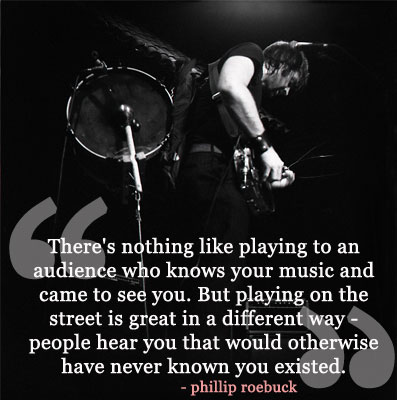
Attraction to the contemporary music world, however, is never far out of sight. He splices the most unexpected sounds into his music to create distinctly modern songs with an archaic twist. But while these neoteric resonances carry through his music, it is in their morals that Phillip finds the greatest prepotence. Fondly remembering the morning after a sold-out Shellac gig in New York's Knitting Factory, where the band played at 9am. "They provided coffee and Krispy Kreme donuts for everyone during the show. They've influenced me a lot in that way - their generous ethics are infectious.
At 22, Phillip moved to New York and got by playing in the Subway. Accrediting New York with the development of his sound, one can almost imagine the smile as he says, "...but why it's fast I don't know. It just excites me and keeps me interested somehow. In 2002, his efforts were recognised when he was honoured with the New York Press' "Subway Musician of the Year". To this day, Phillip can still be found playing his wares on street corners. Self-publicising and defining his attitudes towards music by playing to new audiences, epitomised by the nigh-folkloric appearance outside a bar the night before All Tomorrow's Parties in 2004.
"There's nothing like playing to an audience who knows your music and came to see you. But playing on the street is great in a different way - people hear you that would otherwise have never known you existed. Having a toddler bust out dance moves while your playing or having an elderly couple buy your CD just doesn't happen anywhere else. Recently, I was playing and this breakdancing battle erupted, using me as the music. That was awesome. The only thing was - I didn't feel like I could stop or I'd ruin it. So I just kept going for like fifteen minutes. I thought I was gonna pass out. Finally I broke a string and had to stop, then the whole thing dissolved."
Called everything from "The Banjo Ninja" to "The Cowboy Kerry King", Roebuck has slowly made a name for himself, both through New York bands The Boggs and Brooklyn Browngrass. While he confesses to missing the fun of playing with a band, the one-man band is his main horse these days, with a new album, Fever Pitch, due for an October release and again recorded with Albini.
Fever Pitch is to be more asperous than what we already know. "A one man band record that rocks from start to finish without a rest," he says. "Something closer to a live show. A much grittier and more raucous manifestation, but with no major departures from One Man Band. "I'm not playing electric, multi-tracking or anything like that. It's still about what I can do alone with these instruments."
His apercus that the album is being single-handedly defined by a rudimentary distortion device fashioned from safety pins stands as a testament to the gonzo genius and D.I.Y attitude that he has carried across the globe. With songs that reverberate with an aberrant panache and disseminate a sound like no other, he keeps true to the 'play anywhere... to anyone' ethics of his predecessors. As at home on the street corners of New York as he is on stages around the world, Phillip is a chimeric creation of circumstance and accident. The most untainted kind of genius. A true, modern day American troubadour.



